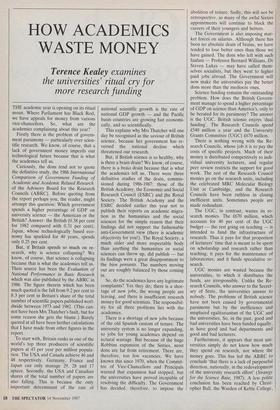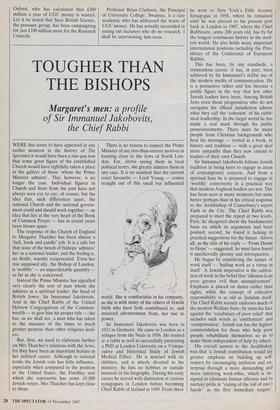HOW ACADEMICS WASTE MONEY
Terence Kealey examines
the universities' ritual cry for more research funding
THE academic year is opening on its ritual moan. Where Parliament has Black Rod, we have appeals for money from various vice-chancellors. So, what are the academics complaining about this year?
Firstly there is the problem of govern- ment parsimony — particularly over scien- tific research. We know, of course, that a lack of government money imperils our technological future because that is what the academics tell us.
Curiously, the dons tend not to quote the definitive study, the 1986 International Comparison of Government Funding of Academic and Academic Related Research of the Advisory Board for the Research Councils (ABRC). Before quoting from the report perhaps you, the reader, might attempt this question: Which government spends a higher percentage of GDP on university science — the American or the British? Answer: the British (0.38 per cent for 1982 compared with 0.31 per cent). Japan, whose technologically based eco- nomy has sparkled for 40 years, spends only 0.25 per cent.
But, if Britain spends so much on re- search, why is science collapsing? We know, of course, that science is collapsing because that is what the academics tell us. Their source has been the Evaluation of National Performance in Basic Research which was also published by the ABRC in 1986. The figure therein which has been much quoted is the fall from 9.2 per cent to 8.3 per cent in Britain's share of the total number of scientific papers published worl- dwide between 1973 and 1982. (This can- not have been Mrs Thatcher's fault, but for some reason she gets the blame.) Barely quoted at all have been further calculations that I have made from other figures in the report.
To start with, Britain ranks as one of the world's top three producers of scientific papers at 43 per year per million popula- tion. The USA and Canada achieve 46 and 48 respectively. Germany, France and Japan can only manage 29, 28 and 17 apiece. Secondly, the USA and Canadian shares of the total number of papers are also falling. This is because the only important determinant of the rate of national scientific growth is the rate of national GDP growth — and the Pacific basin countries are growing fast economi- cally, and so scientifically.
This explains why Mrs Thatcher will one day be recognised as the saviour of British science, because her government has re- versed the national decline which threatened our research.
But, if British science is so healthy, why is there a brain drain? We know, of course, there is a brain drain because that is what the academics tell us. There were three definitive studies of the drain, commis- sioned during 1986-1987: those of the British Academy, the Economic and Social Research Council (ESRC) and the Royal Society. The British Academy and the ESRC decided earlier this year not to publish their reports on academic migra- tion in the humanities and the social sciences for the simple reason that their findings did not support the fashionable anti-Government view (there is academic objectivity for you!). The Royal Society, a much older and more respectable body than anything the humanities or social sciences can throw up, did publish — but its findings were a great disappontment to the bien pensants. The numbers moving out are roughly balanced by those coming in.
So, do the academics have any legitimate complaints? Yes they do; there is a shor- tage of new jobs, the wrong people are leaving, and there is insufficient research money for good scientists. The responsibil- ity for all three problems lies with the academics.
There is a shortage of new jobs because of the old Spanish custom of tenure. The university system is no longer expanding, so jobs for young academics depend on natural wastage. But because of the huge Robbins expansion of the Sixties, most dons are far from retirement. There are, therefore, too few vacancies. We have known this since 1970, when the Commit- tee of Vice-Chancellors and Principals warned that expansion had stopped, but the universities have proved incapable of resolving the difficulty. The Government has decided, therefore, to impose the abolition of tenure. Sadly, this will not be retrospective, so many of the awful Sixties appointments will continue to block the careers of their youngers and betters.
The Government is also imposing mar- ket forces on salaries. Although there has been no absolute drain of brains, we have tended to lose better ones than those we have gained. The dons who left with such fanfare — Professor Bernard Williams, Dr Steven Lukes — may have called them- selves socialists, but they went to higher paid jobs abroad. The Government will now make the universities pay the better dons more than the mediocre ones.
Science funding remains the outstanding problem. How does the British Govern- ment manage to spend a higher percentage of GDP on science than America's, only to be berated for its parsimony? The answer is the UGC. British science enjoys 'dual funding'. The Research Councils spend £540 million a year and the University Grants Committee (UGC) £670 million.
There is nothing wrong with the Re- search Councils, whose job it is to pay the costs of specific projects. Much of their money is distributed competitively to indi- vidual university lecturers, and regular peer review restricts the support for good work. The rest of the Research Council monies go on the research units, including the celebrated MRC Molecular Biology Unit at Cambridge, and the Research Councils have been ruthless in closing inefficient units. Sometimes people are made redundant.
The UGC, in contrast, wastes its re- search monies. The £670 million, which accounts for 40 per cent of the UGC budget — the rest going on teaching — is intended to fund the infrastructure of research. Thus it pays for that proportion of lecturers' time that is meant to be spent on scholarship and research rather than teaching; it pays for the maintenance of laboratories; and it funds speculative re- search.
UGC monies are wasted because the universities, to which it distributes the funds, are irresponsible. Unlike the Re- search Councils, who answer to the Secret- ary of State, the universities answer to nobody. The problems of British science have not been caused by governmental parsimony but by the inefficiency and misplaced egalitarianism of the UGC and the universities. So, in the past, good and bad universities have been funded equally, as have good and bad departments and good and bad lecturers.
Furthermore, it appears that most uni- versities simply do not know how much they spend on research, nor where the money goes. This has led the ABRC to conclude 'that there is a lack of purposeful direction, nationally, in the redevelopment of the university research effort' (Strategy for the Science Base, 1987). A less polite conclusion has been reached by Christ- opher Ball, the Warden of Keble College, Oxford, who has calculated that £300 million a year of UGC money is wasted. Let it be noted that Save British Science, the pressure group, has been campaigning for just £100 million more for the Research Councils. Professor Brian Clarkson, the Principal of University College, Swansea, is a rare academic who has addressed the waste of UGC money. He has actually succeeded in easing out lecturers who do no research. I shall be interviewing him soon.











































































 Previous page
Previous page